Dragon claws leave mark
Updated: 2012-12-28 06:47
(HK Edition)
|
|||||||


As we bid adieu to the Year of the Dragon 2012, a quick review of big economic events in HK over the challenges-filled year might be helpful for us to cope with the unpredictable 2013. China Daily has picked the city's top 10 economic events for our readers to read and digest.
1. Govt unveils toughest ever property curbs
The Hong Kong government on Oct 26, 2012 unveiled a new round of curbs on the property market, the toughest ever government measures which included the imposition of a 5-percent rise in punitive Special Stamp Duty (SSD) from the previous one initiated two years ago - ranging from 10 to 20 percent on short term home resales within a three-year period.
It also slapped an unprecedented 15 percent Buyer's Stamp Duty (BSD) on home buyers who were not permanent Hong Kong residents, to rein in investment activities in the city's property sector by investors from the mainland and foreign countries.
The favorable interest rate environment and narrow supply situation has shored up the mass market's overall residential prices by 20.3 percent year-on-year in the first 11 months of the year, according to data by the international property advisor Jones Lang LaSalle.
Hong Kong government warned repeatedly that the market had shown increasing signs of exuberance and the build-up of a bubble risk.
2. Economic growth slows down
The Hong Kong government trimmed the 2012 full year economic growth forecast further to 1.2 percent due to the slowdown in the export and retail sales sectors.
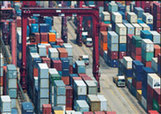
The local economy in the third quarter this year posted a moderate growth of 1.3 percent compared to the same period a year ago, representing a fourth consecutive quarterly low growth.
External demand remained subdued in the face of the recession-ridden European economies, the slow-growing US economy as well as the setback in Asian production and trade flows. Retail sales also slowed down due to the weakening of the tourist spending in the city. Private consumption was generally supported by the favorable employment and income conditions.
The government also lifted the inflation forecast to 3.9 percent for the whole year in 2012 due to the global food price hike, hot money inflows and the renewed pick-up in local residential rentals.
3. HK, mainland ink CEPA Supplement IX
The central government and the Hong Kong government signed the ninth supplement to the Mainland and Hong Kong Closer Economic Partnership Arrangement (CEPA) in late June, aiming to enhance trade and economic cooperation and exchanges between the two places.

Supplement IX to CEPA provides for a total of 43 measures for services liberalization and trade and investment facilitation, including 37 liberalization measures in 22 service sectors. It is aimed at strengthening cooperation in areas of finance, trade and investment facilitation, and promoting the mutual recognition of professional qualifications in the mainland and Hong Kong.
Supplement IX will additionally relax 21 existing service trading sectors, such as legal, accounting, banking, securities and medical services. Moreover, the two sides have agreed to introduce new liberalization measures in education services. All new measures under Supplement IX relating to the liberalization of trade in services will take effect on January 1, 2013. Including the new measures, the two sides have so far announced 338 liberalization measures in 48 service sectors.
4. Bourse buys London Metal Exchange
The Hong Kong stock exchange in June agreed to pay 1.4 billion pounds ($2.2 billion) to buy the London Metal Exchange (LME), a British institution and the world's biggest marketplace for industrial metals.

As the 135-year-old LME, with a record volume of $15.4 trillion last year, sets global benchmark prices for metals including copper, aluminum and nickel, which enabled the city's stock exchange to control about 80 percent of global trade in industrial-metal futures after the merger.
An increase in trading by Chinese companies on the LME is also seen these days. The merger also offers LME a fast track into the mainland and will strengthen its position in the major market against the Shanghai Futures Exchange that trades in base metals.
5. HKMA intervenes to curb HK dollar strength amid money inflows
The Hong Kong Monetary Authority (HKMA) stepped into the currency market on October 20 for the first time since December 2009 as hot money inflows caused the Hong Kong dollar to touch the HK$7.75 versus the US dollar level - the strong end of its permitted trading range.
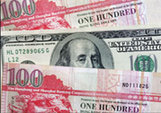
In the following two months, the city's de facto central bank sold a total of $13.9 billion worth of Hong Kong dollars into the market as of Dec 11, 2012, as the local currency repeatedly hit the strong end of its trading range, inflating the value of the Hong Kong dollar and distorting its peg with the US dollar.
HKMA said it will defend the 29-year-old Hong Kong dollar peg to the greenback despite its interventions lifting the aggregate balance - the sum of balances on clearing accounts maintained by banks with the HKMA - to higher levels.
6. SFC proposes tough regulation for IPO sponsors
The Securities and Futures Commission proposed to make investment banks criminally liable for false statements in initial public offering (IPO) documents in a bid to better protect investors after a series of accounting scandals.

The proposals seek changes to Hong Kong's company law to ensure that sponsors of initial public offerings face the same civil and criminal liability as company directors if a listing prospectus is found to have misled investors.
The SFC's new recommendations on prospectus liability are not legally binding. The regulator will now have to apply to the government to put the proposals before the city's Legislative Council.
7. HSBC, StanChart fined in US
Two British banking giants reached settlements with US regulators in December, with HSBC forfeiting $1.25 billion, and paying another $665 million in civil penalties, while Standard Chartered agreed to pay a $327 million penalty, for violating US sanctions in money-laundering probes.
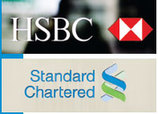
HSBC, the largest bank by market value in Europe, was accused by US authorities of giving Iran, terrorists and drug dealers access to the country's financial system.
Standard Chartered was accused of helping Iran launder about $250 billion in violation of federal laws, keeping false records and handling lucrative wire transfers for Iranian clients. The $327 million charge was on top of the $340 million settlement fee paid to the New York State Department of Financial Services (NY DFS) in the third quarter.
8. Yuan-denominated investment products flare up
More yuan-denominated investment products are flaring up in the city, as the depth and the breadth of the product range are becoming increasingly diversified.
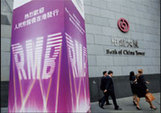
The city's first deliverable yuan currency futures contract traded on the Hong Kong Exchanges and Clearing Ltd made its debut in September.
The new yuan-denominated derivative product will provide mainland institutions, qualified overseas institutional investor fund managers, mainland and overseas companies engaging in cross-border trade settlements, as well as overseas institutions who want to make direct investments on the mainland, with a financial tool to hedge the yuan currency fluctuation risk.
At the same time, the investment quota and profile of renminbi qualified foreign institutional investors (RQFII) are also growing.
9. IPO market loses its luster
After securing the accolade as the top listing destination from 2009 to 2011, the value of IPOs listing in Hong Kong has dropped sharply this year and its global ranking is set to tumble down as well.
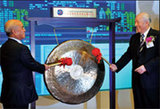
The bad macroeconomic news around the world and the continuing slowdown of the mainland economy have weighed on Hong Kong's stock market, driving the city's once equity-crazy investors to consider fixed income investments or move to the sidelines.
The heightened scrutiny over listing companies as a result of the explosion of accounting scandals at private mainland companies have also made it harder for listings to get the green light.
The problem for Hong Kong is that its traditional source of IPOs - big Chinese state-owned enterprises - is running dry because most of them were listed during the past decade.
10. Qianhai Devt Zone approved
The State Council in July approved development and opening-up policies for the Qianhai Shenzhen-Hong Kong Modern Service Industry Cooperation Zone, paving the way for closer cooperation between Hong Kong and Shenzhen.

The policies, approved by the State Council, will cover six sectors - finance, taxation, legal system, talents, education and medical treatment, and telecommunications. The zone, a stretch of 15-square kilometer reclaimed land in Qianhai Bay, is in western Shenzhen and near Hong Kong and Macao.
The central government aims to build Qianhai into a "pioneering zone" to forge closer cooperation between Hong Kong and the mainland. Under the plan, Qianhai will become a test land for its financial industry open-up, including preparations for cross-border loan issuance experiment and establishment of a trial zone to run cross-border yuan businesses.
(HK Edition 12/28/2012 page2)